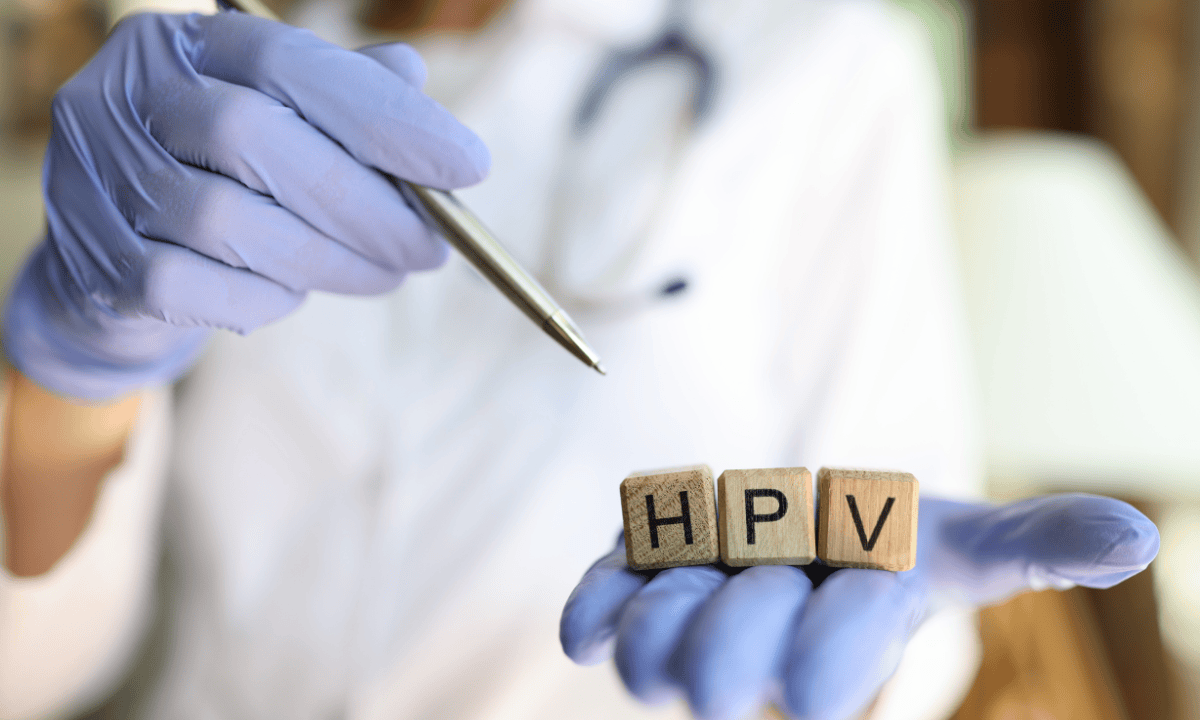HPV is one of the most common sexually transmitted infections (STIs), yet people often feel confused about it and are sometimes misinformed. If you have recently been diagnosed, are considering vaccinations, or simply want to understand more, having clear, accurate information can help ease your concerns.
What is human papillomavirus (HPV)?
HPV is one of the most common sexually transmitted infections (STIs) among sexually active people worldwide. It's so common that most sexually active individuals will encounter it at some point.
HPV is actually a group of more than 200 related viruses. Some types cause common warts on hands or feet, while others affect the genital area. Most HPV infections don't cause any symptoms and go away on their own within two years as your immune system clears the virus naturally.
HPV types
HPVs are classified into two types based on their health risks:
Low-risk types (HPV types 6 and 11):
They can cause genital warts and recurrent respiratory papillomatosis, a disease of the airways. They do not cause cancer.
High-risk types (HPV types 16 and 18):
They can cause most cervical, anal, throat, vulvar, vaginal, and penile cancers. They can also cause precancerous changes (abnormal cell changes that could become cancerous if left untreated) that can be detected and treated early by your doctor.
Regular screenings and HPV vaccines significantly reduce the risk of complications. Talk with your health provider about your personal risk and ways to prevent HPV.
What causes HPV?
HPV spreads through direct skin-to-skin contact with an infected person. You can get HPV through:
Vaginal, anal, or oral sex with someone who has the virus
Intimate touching of the genital areas, even without penetration
Childbirth, though this is rare (the virus can pass from mother to baby during vaginal delivery through contact with infected tissue)
Who does HPV affect?
HPV can affect anyone who is sexually active. You can get the virus through vaginal, anal, or oral sex, or even through close skin-to-skin contact in the genital area. If your partner has HPV, it can be passed on – even if they don’t have visible symptoms.
If you have HIV or a weakened immune system, your body may find it harder to clear HPV infections.
HPV in females
Women face the highest risk of cervical cancer from HPV because certain high-risk strains may develop into cancer over time if not detected and treated early.
Regular Pap smears and HPV tests can identify cell changes before they become cancerous. HPV can also cause genital warts, which may appear weeks or months after exposure.
HPV in males
For men, HPV usually causes fewer long-term health issues. Most HPV infections clear on their own without treatment. However, the virus can sometimes cause genital warts or, in rare cases, lead to cancers of the penis, anus, throat, or mouth.
Routine HPV or Pap tests aren’t generally recommended for men, but HPV vaccination still provides strong protection against high-risk strains.
What are the symptoms of HPV?

Most HPV infections produce no symptoms. As mentioned earlier, your immune system clears the virus before you notice anything wrong. When symptoms appear, they depend on whether you have low-risk or high-risk HPV types.
Genital warts
Low-risk HPV types cause visible genital warts. These flesh-coloured or grey bumps can appear on the following areas of your body:
Vulva, vagina, cervix, or anus
Penis, scrotum, groin, or anus
Inner thighs
Warts may be flat or raised, single or clustered. They don't cause cancer but can multiply and spread to new areas.
Precancerous cell changes
High-risk HPV rarely causes noticeable symptoms until serious harm occurs. Abnormal Pap smear results can provide the first warning of cell changes in your cervix before cancer develops.
Cancer symptoms
If high-risk HPV progresses to cancer, symptoms vary by location:
Cervical cancer causes abnormal vaginal bleeding (between periods or after sex), pelvic pain, or unusual vaginal discharge.
Throat and mouth cancers create persistent sore throats, ear pain, trouble swallowing, or lumps in your neck.
Anal and penile cancers produce bleeding, pain, lumps, or discharge in affected areas.
These cancers take years or decades to develop from initial HPV infection.
If you have concerns about HPV having abnormal screening results, or experiencing visible symptoms, consult an obstetrician and gynaecology (O&G) specialist. Contact Thomson Medical to schedule an HPV screening and receive personalised care tailored for your sexual health needs.
Our HPV specialists
Loading...
What are the complications of HPV?
If a high-risk HPV infection doesn't go away on its own and isn't treated, it can lead to serious health problems over time, such as:
Cervical cancer:
This is the most common type of cancer that is linked to HPV.
Other cancers:
This includes cancers of the anus, vagina, vulva, penis, and throat.
Recurrent respiratory papillomatosis:
This is a condition that causes the repeated growth of small lumps (like warts) in the airways. This rare condition makes it difficult to breathe.
Genital warts from low-risk HPV:
This can cause itching and discomfort and affect your daily life and intimate relationships.
They don’t usually cause cancer or any additional significant medical problems, but you might need to have them treated if they bother you.
Getting regular check-ups and vaccinations can help reduce your risk of these complications.
How is HPV diagnosed?

How HPV is diagnosed depends on whether it causes a visible symptom, which includes:.
Pap smear (for women):
This test checks for abnormal cells in your cervix that may be caused by HPV.
HPV DNA test (for women):
This helps identify high-risk HPV types that can increase the risk of cervical cancer.
Visual examination:
Your doctor may diagnose genital warts simply by looking at them.
Biopsy:
If any abnormal tissue or growth is found, a small sample may be taken for further testing.
As of now, there isn’t an approved HPV test for men, although research is ongoing to develop one.
What is the treatment for HPV?
While HPV itself has no treatment, its symptoms can be treated and managed effectively.
If you have genital warts, your doctor will likely prescribe topical creams, freezing (cryotherapy), or removal of the warts with a minor surgical procedure.
If you have precancerous changes to your cells, your doctor may conduct a LEEP (loop electrosurgical excision procedure) or conisation to remove abnormal cells before they become cancerous.
If your body has developed HPV-related cancer, treatment will depend on the type of cancer and its stage, which may include surgery, radiation therapy, or chemotherapy.
Routine screening tests and timely treatment can detect and treat most HPV-related conditions early.
How to prevent HPV?
While you can't completely eliminate your HPV risk, these steps can help reduce your chances of infection and its complications:
Get vaccinated:
The HPV vaccination is safe and effective and helps protect individuals from acquiring high-risk HPV strains, the strains that can cause HPV-related cancers, as well as the strains that lead to warts.
The vaccination is recommended for men and women, ideally before becoming sexually active.
Use condoms:
Using condoms consistently can reduce your risk of HPV; however, you can still acquire HPV from skin-to-skin contact, and as a result condoms do not entirely lower your risk of exposure.
Get regular screening:
Pap smears and HPV tests may also be done in a routine check-up to identify early cell changes before a person develops cancer.
Limit partners:
Reducing the number of sexual partners you have can reduce your risk of virus exposure.
Are you concerned about HPV, considering screening, or tested positive? Our O&G specialists at Thomson Medical provide HPV testing, vaccination, and treatment for abnormal results. Schedule a consultation to receive a personalised care.
FAQ
Why am I suddenly HPV positive?
HPV can stay inactive in your body for many years before showing up on a test. A positive result doesn’t always mean you’ve just been infected – it may bean older infection that has recently become detectable.
Will HPV go away on its own?
In most cases, yes. Your immune system can clear HPV naturally within one to two years. However, some high-risk strains may persist and cause health issues if not monitored.
How does someone get HPV?
HPV spreads through close skin-to-skin contact during vaginal, anal, or oral sex. You can get it even if your partner doesn’t have visible symptoms.
What should I do if I have HPV?
Follow your doctor’s advice for follow-up tests or treatment. Keep up with Pap smears and HPV screenings, avoid smoking (as it weakens your immune system), and inform your partner. Most HPV infections clear on their own with time and care.
Can I pass HPV to my partner?
Yes. HPV is very contagious and can spread even when there are no visible signs or symptoms. Using condoms and getting vaccinated can help reduce transmission.
Should I get the HPV vaccine if I already have HPV?
Yes. The vaccine protects against several HPV types, so even if you’re infected with one strain, it can still protect you from others.
The information provided is intended for general guidance only and should not be considered medical advice. For personalised recommendations and tailored advice, please consult a specialist at Thomson Medical. Request an appointment with Thomson Medical today.
For more information, contact us:
Thomson Specialists (Women's Health)
Thomson Women's Clinic (TWC)
- Novena:
6592 6686 (Call), 8611 8986 (WA) - Bukit Batok:
6569 0668 (Call), 8686 3525 (WA) - Choa Chu Kang:
6893 1227 (Call), 8282 1796 (WA) Jurong:
6262 8588 (Call), 6262 8588 (WA)- Katong (female doctor):
6970 2272 (Call), 8611 9020 (WA) - Punggol:
6243 6843 (Call), 8811 0328 (WA) - Sembawang: 6753 5228
- Sengkang: 6388 8125
- Serangoon (female doctor): 6382 3313
- Tampines: 6857 6266
- Tiong Bahru: 6276 1525
